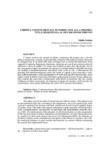Mostrar o rexistro simple do ítem
Libertà costituzionale di porre fine alla propria vita e resistenza al suo riconoscimento
| dc.contributor.author | Gemma, Gladio | |
| dc.date.accessioned | 2011-07-12T10:26:58Z | |
| dc.date.available | 2011-07-12T10:26:58Z | |
| dc.date.issued | 2009 | |
| dc.identifier.citation | Anuario da Facultade de Dereito da Universidade da Coruña, 2009, 13: 283-299. ISSN: 1138-039X | es_ES |
| dc.identifier.issn | 1138-039X | |
| dc.identifier.uri | http://hdl.handle.net/2183/7536 | |
| dc.description.abstract | [Abstract] The author asserts the right of renouncing one’s life by choice. This option is not an unconditional right, but, according to the mainstream , has to be granted only when a person’s existence has become extremely painful and devoid of an acceptable degree of quality of life. This right is the logical consequence of the principles of liberal-demo- cratic constitutionalism, and therefore of individual self-determination about the choi- ces of life. The enforcement of the principle of self-determination as to the renunciation of life has been delayed both in legislation and jurisprudence of many liberal-democra- tic countries by three main factors: the power of confessional lobbies, the influence of bioethics contrary to the constitutional conception of the liberty to renounce one’s life, the emotional tendency to reject suicide and homicide by consent without considering the reasons that might justify them. | es_ES |
| dc.language.iso | ita | es_ES |
| dc.publisher | Universidade da Coruña | es_ES |
| dc.subject | Costituzionalismo liberaldemocratico | es_ES |
| dc.subject | Autodeterminazione | es_ES |
| dc.subject | Diritto di morire | es_ES |
| dc.subject | Rifiuto di morte anticipata | es_ES |
| dc.subject | Liberal-democratic constituionalims | es_ES |
| dc.subject | Self-determination | es_ES |
| dc.subject | Right to die | es_ES |
| dc.subject | Rejection of before-time death | es_ES |
| dc.title | Libertà costituzionale di porre fine alla propria vita e resistenza al suo riconoscimento | es_ES |
| dc.type | info:eu-repo/semantics/article | es_ES |
| dc.rights.access | info:eu-repo/semantics/openAccess |






